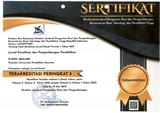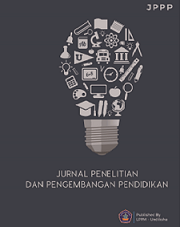BELITUNG: Mathematics Learning Media for Grade III Elementary School
DOI:
https://doi.org/10.23887/jppp.v7i1.57688Keywords:
Development, Media, Math, Elementary SchoolAbstract
The concept of adding and subtracting integers is a concept that absolutely must be mastered by anyone who studies mathematics. Students still have low understanding of mathematical concepts is caused by the teacher's role in controlling the learning process. Therefore, this research aims to develop Counting Trajectory Learning media (BELITUNG) as a solution to students' problems in learning integers for grade III SD. This research is research and development (Research and Development) with the ADDIE model. Data was obtained by conducting observations, interviews, and questionnaires. After conducting research and development on BELITUNG media, it was found that the score of media experts was 4.1 with a percentage of 82%, and material experts 4.4 with a percentage of 88%. Both stated that this medium was very good. After being tested by experts and revised, then limited trials were carried out on students who were accompanied by the class teacher as expert practitioners. Limited trials get a score of 4.7 percentage 94% if it is converted into qualitative then the media is said to be very good. Based on research and development, it can be concluded that the development of BELITUNG media for learning integers for grade III SD shows that the media is suitable for use in class because it meets very good criteria.
References
Afandi, M., Chamalah, E., & Wardani, O. P. (2013). Model Dan Metode Pembelajaran Di Sekolah. In Perpustakaan Nasional Katalog Dalam Terbitan (KDT) (Vol. 392, Issue 2). https://doi.org/10.1007/s00423-006-0143-4. DOI: https://doi.org/10.1007/s00423-006-0143-4
Aldoobie, N. (2015). ADDIE Model. American International Journal of Contemporary Research, 5(6). www.aijcrnet.com/journals/Vol_5_No_6_December_2015/10.pdf
Andrijat, N. (2014). Penerapan Media Pembelajaran Inovatif dalam Pembelajaran Matematika Sekolah Dasar di PGSD UPP Tegal. Jurnal Penelitian Pendidikan, 31(2). https://doi.org/https://doi.org/10.15294/jpp.v31i2.5696.
Batubara, H. H. (2015). Pengembangan Media Pembelajaran Interaktif pada Bilangan Bulat. Jurnal Madrasah Ibtidaiyah, 1(1). https://doi.org/10.31602/muallimuna.v1i1.271. DOI: https://doi.org/10.31602/muallimuna.v1i1.271
Beer, P., & Mulder, R. H. (2020). The Effects of Technological Developments on Work and Their Implications for Continuous Vocational Education and Training: A Systematic Review. In Frontiers in psychology (Vol. 11, p. 918). https://doi.org/10.3389/fpsyg.2020.00918. DOI: https://doi.org/10.3389/fpsyg.2020.00918
Bell, D. V. J. (2016). Twenty-first century education: Transformative education for sustainability and responsible citizenship. Journal of Teacher Education for Sustainability, 18(1), 48–56. https://doi.org/10.1515/jtes-2016-0004. DOI: https://doi.org/10.1515/jtes-2016-0004
Buyung, Wahyuni, R., & Mariyam. (2022). Faktor Penyebab Rendahnya Pemahaman Siswa Pada Mata Pelajaran Matematika Di SD 14 Semperiuk A. Journal Of Educational Review And Research, 5(1). https://doi.org/http://dx.doi.org/10.26737/jerr.v5i1.3538.
Cahyadi, R. A. H. (2019). Pengembangan Bahan Ajar Berbasis Addie Model. Halaqa: Islamic Education Journal, 3(1), 35–42. https://doi.org/10.21070/halaqa.v3i1.2124. DOI: https://doi.org/10.21070/halaqa.v3i1.2124
Crismono, P. C. (2017). Pengaruh Outdoor Learning Terhadap Kemampuan Berpikir Kritis Matematis Siswa. Jurnal Pendidikan Matematika Dan Sains, 5(2). https://doi.org/10.21831/jpms.v5i2.15482. DOI: https://doi.org/10.24853/fbc.2.1.1-8
Fitriani, A. D. (2014). Pengembangan Multimedia Interaktif Dalam Pembelajaran Geometri Untuk Meningkatkan Kemampuan Komunikasi Calon Guru Sekolah Dasar. Edutech, 13(2), 236. https://doi.org/10.17509/edutech.v13i2.3105. DOI: https://doi.org/10.17509/edutech.v13i2.3105
Gustiani, S. (2019). Research And Development (R&D) Method As A Model Design In Educational Research And Its Alternatives. Holistics, 11(2). https://jurnal.polsri.ac.id/index.php/holistic/article/view/1849.
Hadi, S., & Novaliyosi, N. (2019). TIMSS Indonesia (trend in Indonesia mathematic and science study). Prosiding Seminar Nasional & Call For Papers, 0(0). http://jurnal.unsil.ac.id/index.php/sncp/article/view/1096.
Hafa, Suwignyo, & Mudiono. (2017). Penerapan Model Inkuiri untuk Meningkatkan Aktivitas dan Hasil Belajar IPA pada Siswa Kelas V. Jurnal Pendidikan: Teori, Penelitian, Dan Pengembangan, 2(12). https://doi.org/. http://dx.doi.org/10.17977/jptpp.v2i12.10315.
Hamdi, M. M. (2020). Evalusi Kurikulum Pendidikan. Intizam, Jurnal Manajemen Pendidikan Islam, 4(1), 66–75. http://ejournal.staida-krempyang.ac.id/index.php/intizam/article/view/248.
Hartaningrum, E. S. N., & Maarif, S. (2021). Pemanfaatan Media Mistar Hitung untuk Melatih Operasi Hitung Bilangan Bulat pada Siswa MI-Al Hikmah Janti Jogoroto. Comunity Education Engagement Jurnal, 2(2). https://doi.org/10.25299/ceej.v2i2.6445. DOI: https://doi.org/10.25299/ceej.v2i2.6445
Karo-Karo, I. R., & Rohani, R. (2018). Manfaat Media dalam Pembelajaran. AXIOM : Jurnal Pendidikan Dan Matematika, 7(1), 91–96. https://doi.org/10.30821/axiom.v7i1.1778. DOI: https://doi.org/10.30821/axiom.v7i1.1778
Karunasree & Francis. (2020). Developing writing skills of ESL learners using task based language teaching. Jurnal of Critical Reviews, 7(6). http://www.oralliterature.org/collaborations/lokaratna/Lokaratna_12.pdf#page=162. DOI: https://doi.org/10.31838/jcr.07.06.02
Mashuri, S. (2019). Media Pembelajaran Matematika (1st ed.). Deepublish.
Novitasari, M. (2020). Numerical Literacy Ability In Learning Mathematics Based On 21st Century Skills In Primary School. Ilkogretim Online - Elementary Education Online, 19(4). https://doi.org/doi:10.17051/ilkonline.2020.04.121.
Nuralam, & Eliyan. (2017). Penerapan Pendekatan Saintifik Terhadap Kemampuan Pemecahan Masalah Matematika Di SMAN 1 Darul Imarah Aceh Besar. Jurnal Ilmu Ddaktika, 18(1). https://doi.org/10.22373/jid.v18i1.3085. DOI: https://doi.org/10.22373/jid.v18i1.3085
Pramuaji, A. (2017). Pengembangan Media Pembelajaran Interaktif pada Materi Pengenalan Corel Draw sebagai Sarana Pembelajaran Desain Grafis di SMK Muhammadiyah 2 Klaten Utara. Jurnal Elinvo: Electronics, Informatics, and Vocational Education, 2(2). https://doi.org/10.21831/elinvo.v2i2.17312. DOI: https://doi.org/10.21831/elinvo.v2i2.17312
Saputro, P. D. B. (2021). Penelitian pengoembangan (Research and Development) bidang menejemen pendidikan IPA (S. Anam (ed.)). Academia Publication.
Srintin, A. S., Setyadi, D., & Mampouw, H. L. (2019). Pengembangan Media Permainan Kartu Umino Pada Pembelajaran Matematika Operasi Bilangan Bulat. Jurnal Pendidikan Nasional, 3(1). https://doi.org/10.31004/cendekia.v3i1.89. DOI: https://doi.org/10.31004/cendekia.v3i1.89
Sugiono. (2019). Metode Penelitian dan Pengemangan (R&D). Alfabeta.
Suhendri, & Ningsih. (2018). Peranan Ketahanmalangan dan Kreativitas dalam Pembelajaran Matematika. Jurnal Penelitian Dan Pembelajaran Matematika (JPPM), 11(2). https://doi.org/http://dx.doi.org/10.30870/jppm.v11i1.2982. DOI: https://doi.org/10.30870/jppm.v11i1.2982
Sumarsih, & Mukminan. (2016). Pengembangan Multimedia Akuntasi Biaya Metode Harga Pokok Pesanan Bagi Mahasiswa Jurusan Pendidikan Akuntasi UNY. Jurnal Inovasi Teknologi Pendidikan, 3(1). https://doi.org/10.21831/tp.v3i1.8266. DOI: https://doi.org/10.21831/tp.v3i1.8266
Sundari, Fuadi, D., & Hidayati, Y. M. (2022). KemandirianBelajarMatematika Masa PandemiCovid-19pada Siswa SekolahDasar. JURNAL BASICEDU, 6(1). https://doi.org/https://doi.org/10.31004/basicedu.v6i1.2233. DOI: https://doi.org/10.31004/basicedu.v6i1.2233
Thomas, S. V., & Gilbert, J. E. (2016). Integrating Technology to Enhance Athlete Development: A Literature Review. Journal of Higher Education Athletics & Innovation, 1(1), 73–84. https://doi.org/10.15763/issn.2376-5267.2016.1.1.73-84. DOI: https://doi.org/10.15763/issn.2376-5267.2016.1.1.73-84
Umbara, U., & Suryadi, D. (2019). Re-Interpretation of Mathematical Literacy Based on The Teacher’s Perspective. International Journal of Instruction, 12(4), 789–806. https://doi.org/10.29333/iji.2019.12450a. DOI: https://doi.org/10.29333/iji.2019.12450a
Wibowo, S., & Nilawati, F. E. (2015). Media Pembelajaran Animasi Penyerbukan Pada Tumbuhan Menggunakan Macromedia Flash 8. Jurnal Teknologi Informasi, 14(2). https://doi.org/https://doi.org/10.33633/tc.v14i2.889.
Widyawati, A., & Usman, D. O. (2020). The Influence Of Learning Media, Teaching Methods, E_Learning And Teacher’s Creativity Of Learning Interest. Jurnal Pendidikan Ilmu Pengetahuan, 1(1). https://doi.org/10.2139/ssrn.3637514. DOI: https://doi.org/10.2139/ssrn.3510040
Wulandari, Ainy, & Suprapti. (2017). Pengembangan Media Pembelajaran Matematika Berbasis Games Interaktif Menggunakan Aplikasi Adobe Flash CS3 pada Materi Pokok Trigonometri Kelas X SMKN 10 Surabaya. MUST: Journal of Mathematics Education, Science & Technology, 2(2), 165–177. http://journal.um-surabaya.ac.id/index.php/matematika/article/view/581.
Yudi. (2016). Pengaruh Menggunakan Software Macromedia Flash 8 Terhadap Hasil Belajar Matematika Siswa Kelas VIII. Jurnal Pendidikan Matematika, 1(1). https://doi.org/10.22236/KALAMATIKA.vol1no1.2016pp84-92. DOI: https://doi.org/10.22236/KALAMATIKA.vol1no1.2016pp84-92
Downloads
Published
How to Cite
Issue
Section
License
Copyright (c) 2023 Ulfah Dewi Rahmawati, Nur Amalia

This work is licensed under a Creative Commons Attribution-ShareAlike 4.0 International License.
Authors who publish with the Jurnal Penelitian dan Pengembangan Pendidikan agree to the following terms:
- Authors retain copyright and grant the journal the right of first publication with the work simultaneously licensed under a Creative Commons Attribution License (CC BY-SA 4.0) that allows others to share the work with an acknowledgment of the work's authorship and initial publication in this journal.
- Authors are able to enter into separate, additional contractual arrangements for the non-exclusive distribution of the journal's published version of the work (e.g., post it to an institutional repository or publish it in a book), with an acknowledgment of its initial publication in this journal.
- Authors are permitted and encouraged to post their work online (e.g., in institutional repositories or on their website) prior to and during the submission process, as it can lead to productive exchanges, as well as earlier and greater citation of published work. (See The Effect of Open Access)







